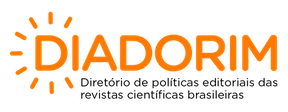Submissions
Submission Preparation Checklist
As part of the submission process, authors are required to check off their submission's compliance with all of the following items, and submissions may be returned to authors that do not adhere to these guidelines.- ATTENTION!!! After completing your registration, click on your login, located in the upper right corner of the screen. Then, choose the "PROFILE" option and fill in the mandatory fields, such as the URL (Lattes address, for those working in Brazil; otherwise, use the link to your curriculum at the foreign institution repository ), Mini Curriculum (400 to 800 characters, highlighting your education and professional experience), and, above all, create or link your ORCID. Ensure that all co-authors are registered and have their profiles properly filled out. This procedure must be done BEFORE uploading the file to ensure that the metadata is loaded upon submission.
- In case of submission to a peer-reviewed section (eg articles), the instructions available on Assuring blind peer evaluation were followed.
- The contribution is original and unpublished, and is not being evaluated for publication by another journal; otherwise, it should be justified in "Editor Comments"
- The submission file is in Microsoft Word, OpenOffice or RTF format.
- The text follows the formatting of the journal’s official template, which complies with the accessibility and formatting standards established by the UFG Journal Portal.
- Text is in space 1.5; uses a 12-point Times New Roman font; uses italic instead of underlining (except URL addresses); the figures and tables are inserted in the text, not at the end of the document in the form of attachments.
- The text follows the style standards and bibliographic requirements described in Author Guidelines on the About the Journal page.
- If there is more than one author, please indicate the contribution of each one. At the stage of the editorial process in which the article is approved by the reviewers, there will be a specific field to fill in the template that we will send to the authors.
- In case of research involving human subjects, it is required to submit, in a supplementary document, the Informed Consent Forms (ICF) corresponding to the research participants or the approval opinion from the ethics committee.
Outras Palavras
"Outras Palavras" publishes academic texts dealing with Music and its Interfaces with mandatory academic rigor and may be an independent view of the author. Free reflections, experience reports (not necessarily resulting from scientific work), lists of works, lists of collections, interviews, etc. will also be considered.
Dossier SiMN 2023 New Music
Dossier related to SiMN 2023 - 6th edition of the International Symposium on New Music.
SiMN is a biennial event organized by the State University of Paraná and the Núcleo Música Nova de Curitiba research group, with the aim of disseminating and reflecting on contemporary music and sound art, as well as encouraging exchange between the areas of composition, music electroacoustic, sound art and experimental music, through people from different parts of the world, with an emphasis on Latin America.
This dossier comprises articles selected from the research presented at the Symposium.
Dossier: Music, Curriculum, and Interdisciplinarity: Research Results in Brazil and Spain
This special issue brings together articles that investigate the integration of music as an interdisciplinary axis in formal education curricula, with a focus on developing 21st-century transversal competencies — such as creativity, inclusion, entrepreneurship, and digital literacy. It aims to foster academic dialogue and the sharing of experiences that expand the boundaries of interdisciplinary music education among researchers from Brazil and Spain.
Special Issue on the 19th Brazilian Symposium on Computer Music
Special Issue on the 19th Brazilian Symposium on Computer Music
Copyright Notice
The authors retain the copyright and full publishing rights without restrictions
Privacy Statement
The names and addresses informed in this journal will be used exclusively for the services provided by this publication and will not be made available for other purposes or to third parties.










